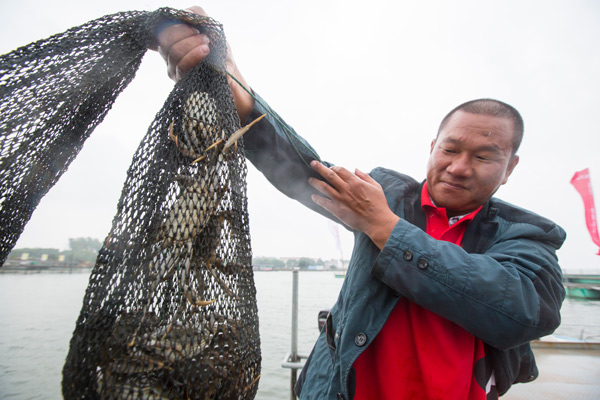Hairy crab war starts online
 |
|
A fisherman with a net of hairy crabs at Yangcheng Lake, Suzhou, East China's Jiangsu province. [Photo provided to China Daily] |
As anglers netted the first haul of Yangcheng Lake hairy crabs on Saturday, marking the beginning of this year's season, leading e-commerce platforms had already cast their net beyond the lake, offering more choices to consumers.
Yangcheng Lake, a freshwater lake in Suzhou, Jiangsu province, has long been reputed as the home of the tastiest large freshwater crabs.
However, this year's output from Yangcheng Lake is expected to contract to 1,200 metric tons, down from 2,100 tons last year, according to Hu Jianguo, secretary-general of Suzhou Yangcheng Lake Crab Association.
This is mainly because the crab breeding area has been halved to 10.7 square kilometers this year in order to preserve the aquatic environment in the area. As a result, the price will rise 15 percent this year.
But the average weight of each crab will increase 6.2 percent compared to last year, according to Suzhou Municipal Agricultural Commission.
While the output of Yangcheng Lake crabs has declined, consumer demand has not diminished. According to Nanjing-based online marketplace Suning, it received more than 200,000 orders on Sept 20 when it started pre-sale of hairy crabs.
Statistics provided by China's largest online travel agency Ctrip show that the searches for trips featuring hairy crab meals surged 2,000 percent between Sept 20 and 25.
Addressing such enthusiasm, e-commerce platforms have sought freshwater crabs from locations other than Yangcheng Lake.
A day prior to the beginning of the crab season at Yangcheng Lake, e-commerce giant JD Group marked its cooperation with the government of Sihong county in western Jiangsu province, where freshwater crabs from Hongze Lake promise similar quality to those from Yangcheng Lake.
With JD's own cold-chain delivery network, consumers from more than 200 cities across China can receive crabs within 48 hours. Better quality and bigger crabs are sold at around 15 yuan ($2.3) each.
Wang Xiaosong, vice-president of JD Group, said the company will work with the local government in Sihong to strengthen the supervision of crab breeding so that the brand name of Sihong Lake hairy crab can become as established as those from Yangcheng Lake.
Online marketplace Suning has also been procuring hairy crabs from 13 other locations than Yangcheng Lake to meet the expected surge in demand during the upcoming National Day holiday and Mid-Autumn Festival.
A box of eight Gucheng Lake crabs retails for 108 yuan, cheaper than the same quantity of Yangcheng Lake crabs sold on Suning for 198 yuan.
Tmall, a major online retail arm of e-commerce juggernaut Alibaba Group, has also signed a sales agreement with five other locations. Hairy crab from Panjin in northeastern China's Liaoning province made its debut on Tmall last year. The successful cooperation gave the local government enough confidence to continue sales on Tmall this year. The crabs will be sold at between 26 yuan and 115 yuan each, based on quality and size.
Only 6 percent of the crabs produced in Panjin were sold online in the past, according to Wang Xiaodong, secretary-general of the city government of Panjin, which has an annual output of 70,000 tons of hairy crabs.
However, the majority of the crabs produced there will be sold online this year, he said.
















